模块1 Unit 2 Growing pains Word power 课件(27PPT)
文档属性
| 名称 | 模块1 Unit 2 Growing pains Word power 课件(27PPT) |

|
|
| 格式 | zip | ||
| 文件大小 | 637.3KB | ||
| 资源类型 | 教案 | ||
| 版本资源 | 牛津译林版 | ||
| 科目 | 英语 | ||
| 更新时间 | 2019-08-23 17:01:27 | ||
图片预览

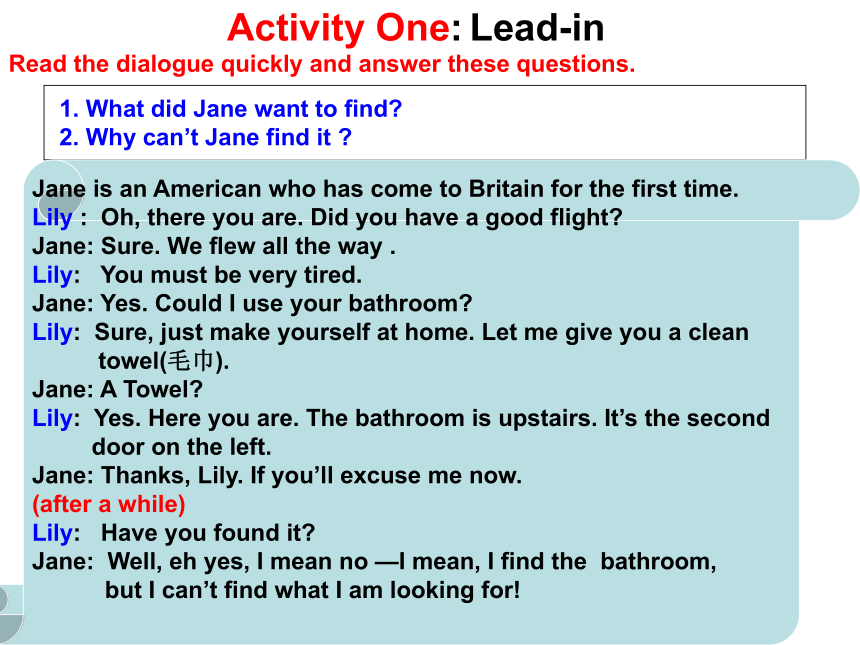
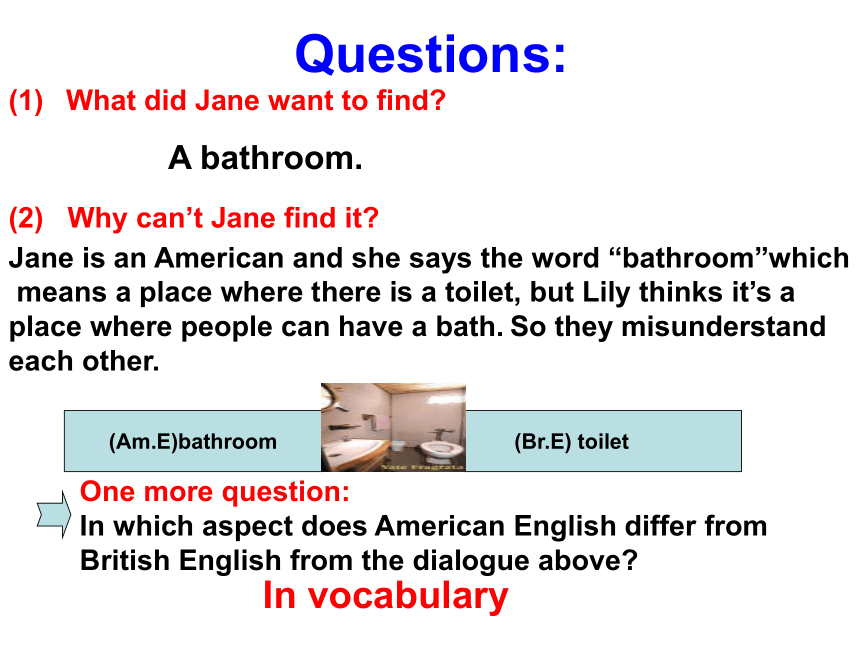

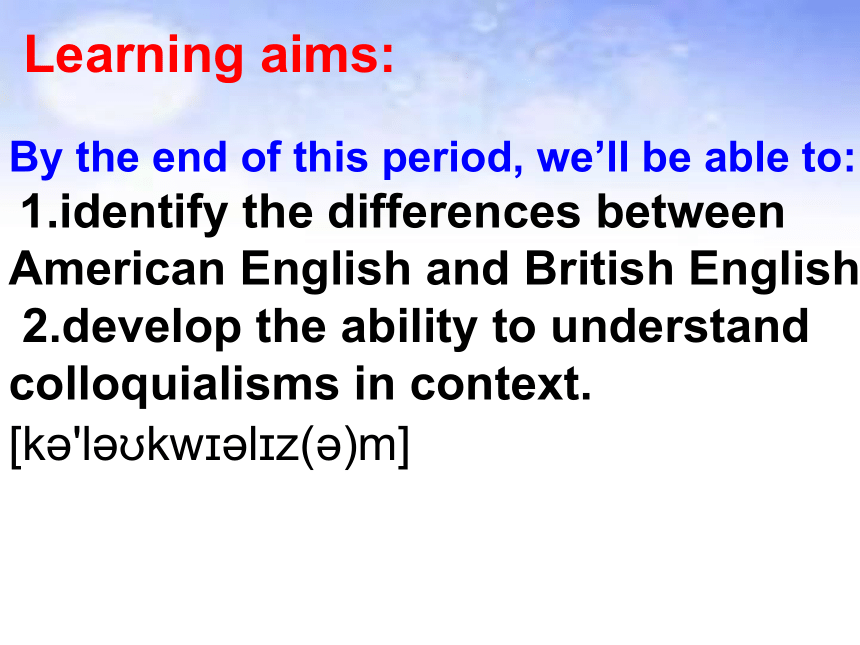
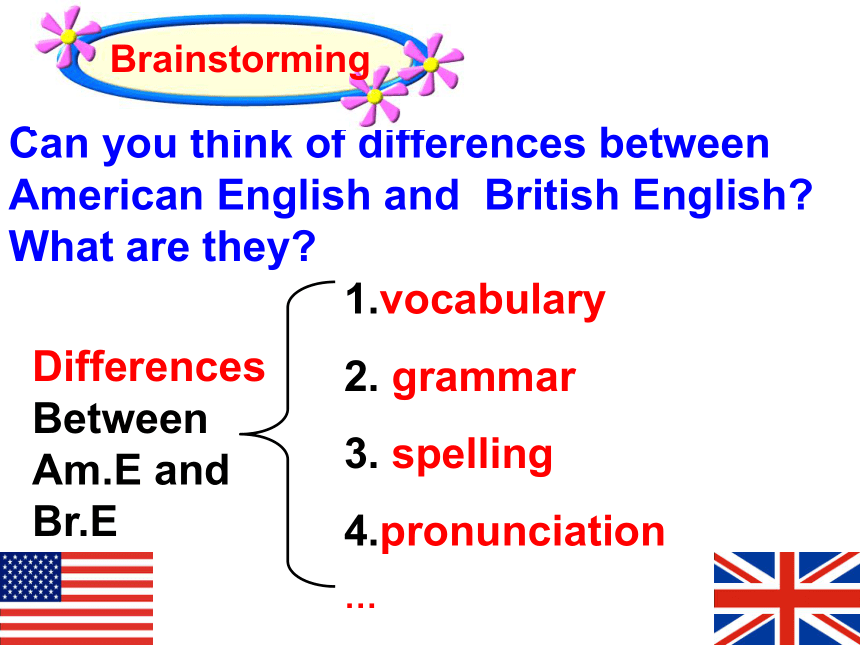
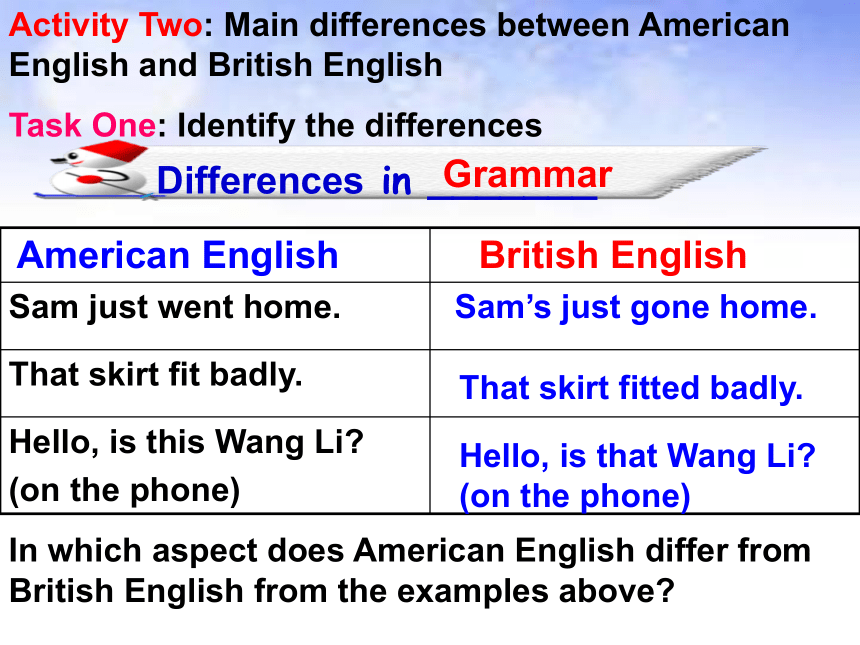
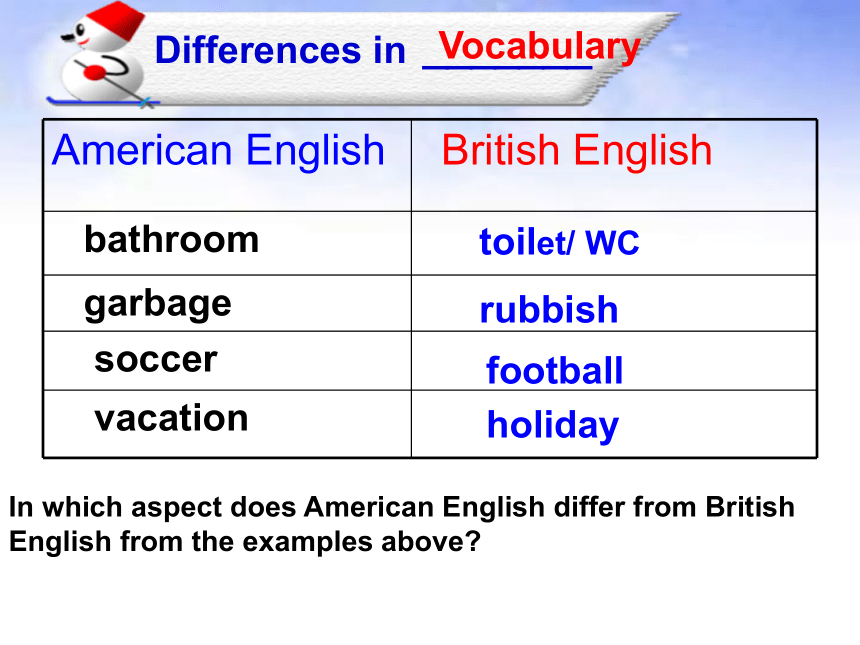
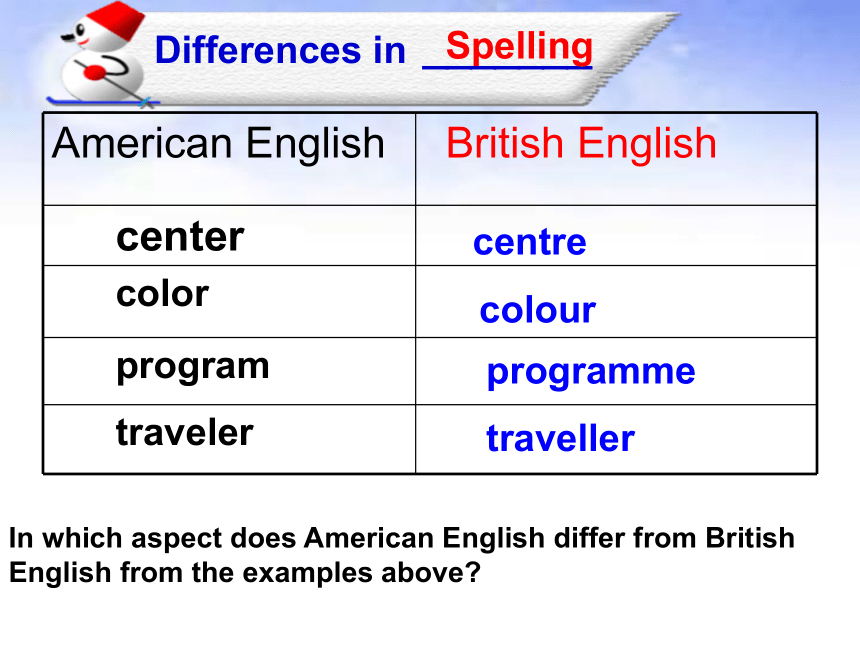
文档简介
课件27张PPT。 Welcome! 牛津高中英语
模块一第二单元
Word power Activity One: Lead-inRead the dialogue quickly and answer these questions.
1. What did Jane want to find?
2. Why can’t Jane find it ?
Jane is an American who has come to Britain for the first time.
Lily : Oh, there you are. Did you have a good flight?
Jane: Sure. We flew all the way .
Lily: You must be very tired.
Jane: Yes. Could I use your bathroom?
Lily: Sure, just make yourself at home. Let me give you a clean
towel(毛巾).
Jane: A Towel?
Lily: Yes. Here you are. The bathroom is upstairs. It’s the second
door on the left.
Jane: Thanks, Lily. If you’ll excuse me now. (after a while)
Lily: Have you found it?
Jane: Well, eh yes, I mean no —I mean, I find the bathroom,
but I can’t find what I am looking for!
Questions:What did Jane want to find?
(2) Why can’t Jane find it?Jane is an American and she says the word “bathroom”which
means a place where there is a toilet, but Lily thinks it’s a
place where people can have a bath. So they misunderstand
each other.(Am.E)bathroom (Br.E) toiletOne more question:
In which aspect does American English differ from
British English from the dialogue above?
In vocabulary
A bathroom.Word power American English VS British English Colloquialisms Growing PainsUnit 2 Learning aims:By the end of this period, we’ll be able to:
1.identify the differences between American English and British English
2.develop the ability to understand colloquialisms in context. [k?'l??kw??l?z(?)m]Can you think of differences between American English and British English? What are they? Brainstorming
DifferencesBetween Am.E and Br.E1.vocabulary
2. grammar
3. spelling
4.pronunciation
…Activity Two: Main differences between American English and British English
Task One: Identify the differences Differences in _______ Sam’s just gone home.
That skirt fitted badly.Hello, is that Wang Li?
(on the phone)
GrammarIn which aspect does American English differ from British English from the examples above?
Differences in _______toilet/ WCrubbishfootballholidayIn which aspect does American English differ from British English from the examples above?VocabularyDifferences in _______centrecolourprogrammetravellerIn which aspect does American English differ from British English from the examples above?
SpellingDifferences in _______ In which aspect does American English differ from British
English from the examples above?
PronunciationTask Two: Change the underlined words and phrases from American English to British English.Li Hua: Hello, (1)is this Dai Jun?
Dai Jun: Yes. Hi, Li Hua, how are you?
Li Hua: I’m okay now, but I just had the worst morning ever!
Dai Jun: What happened?
Li Hua: I went to the shopping (2)center near Huaihai Road, to
change the new shoes I bought, the ones that (3)fit badly, for bigger
ones. One saleswoman was in the (4)bathroom and the other was
watching a TV(5) program behind the counter. Neither of them
would help me! Finally, I got help, but they only had the shoes in a (6)color
I didn’t like. I wanted to complain, but when I asked to see the
manager, they told me,‘Oh, sorry, (7)she just went home .
Dai Jun: What a terrible shop! What did you do?
Li Hua: They gave me a number to phone the manager (8)at , so I
called when I got home. Now I feel a bit better, but I still don’t have new
shoes!is thatcentrefittedtoiletprogrammecolourshe has just gone homeonSam: Hi David.How are you?
David: Fine, have you just gone back from New York?
Sam: Yeah, I went back here last Monday .
David: How is your summer holiday, Sam?
Sam: Excellent, during my summer vacation I joined a soccer ball club and I can play it better now.
David: Good! I also practised playing football this summer too.
Sam: Ok. Please call me at 33543165 if the students’ unions organize a soccer ball match.
David: Good idea! You may call me on 25682275.
Sam: See you!
David: Goodbye! Task Three:Read the dialogue and find out “ Is it in American English or British English?”.(Sam went back to London to go on with his study in CMHS. He met David on the school campus.) _______ speaks American English while _______speaks British English.SamDavidWhich do you like better, American English or British English?That is One man’s meat is another man’s poison.萝卜青菜各有所爱I hate milkI like milka colloquialism(口语体) [k?'l??kw??l?z(?)m]
:
Activity Three: Introduction to Colloquialisms What is a colloquialism?
A colloquialism is an informal expression used in spoken English. Colloquialisms are never used in formal English or in writing, but are often used in conversations.
Tip: In many cases, we can guess the meaning
of colloquialisms through the words used.[k?'l??kw??l?z(?)m]
掌上明珠some examples of colloquialismsIt means :be loved very much by someone.
败家子,害群之马It means: be considered to be bad or worthless in the family of a group.:
I will have a test tomorrow, so I’d better hit the book.
It means :read the book and study hard
hit the book 啃书本,好好学习:
Activity Four: Discussion (work in groups)
What do the following colloquialisms mean?
I have a sweet tooth, but everything in that
chocolate shop costs an arm and a leg. As I
can’t afford to buy some,I just do some window
shopping.
(1) a sweet tooth
一颗蛀牙 B.喜欢吃甜食 C.爱说甜言蜜语
(2)an arm and a leg
A.非常昂贵 B.付出生命的代价 C.手脚并用
:
2. The owner of the chocolate shop is very
curious about something. He is all ears and all
eyes on other people’s discussions. He
becomes a pain in the neck after some time.
Therefore, everyone dislikes him.
(1) all ears and all eyes
耳目众多 B.聚精会神 C.耳闻眼见
(2)a pain in the neck
A.腰酸背疼 B.讨厌的家伙 C.苦不堪言
:
Activity Five: Practice on ColloquialismsTask One: Choose the correct meanings for the matching pictures.
A. joke with someone B. something easy to do
C. boring/afraid to have fun D. listening carefullyDon’t worry. It’s a piece of cake.1234Don’t be a wet blanket. Have some fun! Go on, tell me. I’m all ears.
Are you serious?
Don’t pull my leg.BcDA:
1. Mrs Black’s garden is the best in our town. She really has green fingers.
_______________________________
2. He makes every decision in our company. He is the top dog.
________________________________Task Two:Guess what the following underlined expressions mean.be good at gardeningan important person in an organization:
3.Why did you give her the cold shoulder? You are good friends, aren’t you?
______________________________________
4. I wish I had brought my umbrella. It’s raining cats and dogs.
_________________________________
5. Football is just not my cup of tea. I like playing volleyball.
____________________________________________________________be not friendly to herraining heavilynot really to my taste:
高考链接
Task Three: Multiple choices.
1.---You can’t believe it. The game between Rocket and Lakers was very exciting.
---Come on.__________.
A. That’s a piece of cake.
B. Don’t be a wet blanket.
C. I’m all ears.
D. Don’t pull my leg.
:
2. ---How come Joan hasn’t typed the report yet?
---Oh, my dear lady, take it easy. She is______in computer operation.
A. a green hand B. a black sheep
C. a dark horse D. a lucky dog
3. ---I went up to speak to him, but he turned away and left.
---Why did he give you_________? You are good friends, aren’t you?
A. a wet blanket B. a cup of tea
C. a green finger D. a cold shoulder
4. ---I think the Internet is playing an important role in our daily life. Don’t you think so.
---Yes._________.
A. Great minds think alike.
B. The early bird catches the worm.
C. Facts speak louder than words
D. No pain, no gain 高考链接
:
Activity six: Test what you have mastered on
colloquialisms
Do you have a good memory?
Translation.
1. 小菜一碟
2. 扫兴的人
3. 仔细倾听
4. 与某人开玩笑
5. 下倾盆大雨
6. have green fingers
7. the top dog
8. the apple of one’s eye
9. black sheep
give sb. the cold shoulder
not one’s cup of tea
12. Great minds think alike.
a piece of cake
a wet blanket
be all ears
pull one’s leg
rain cats and dogs
擅长园艺
负责人
掌上明珠
败家子,害群之马
对某人冷淡
不是某人所喜欢的东西
英雄所见略同。:
Homework1.Try to find more differences between American English and British English .
2. Try to find more colloquialisms by referring to the dictionary.
3.Do the exercises of Word power.
Thank you!
模块一第二单元
Word power Activity One: Lead-inRead the dialogue quickly and answer these questions.
1. What did Jane want to find?
2. Why can’t Jane find it ?
Jane is an American who has come to Britain for the first time.
Lily : Oh, there you are. Did you have a good flight?
Jane: Sure. We flew all the way .
Lily: You must be very tired.
Jane: Yes. Could I use your bathroom?
Lily: Sure, just make yourself at home. Let me give you a clean
towel(毛巾).
Jane: A Towel?
Lily: Yes. Here you are. The bathroom is upstairs. It’s the second
door on the left.
Jane: Thanks, Lily. If you’ll excuse me now. (after a while)
Lily: Have you found it?
Jane: Well, eh yes, I mean no —I mean, I find the bathroom,
but I can’t find what I am looking for!
Questions:What did Jane want to find?
(2) Why can’t Jane find it?Jane is an American and she says the word “bathroom”which
means a place where there is a toilet, but Lily thinks it’s a
place where people can have a bath. So they misunderstand
each other.(Am.E)bathroom (Br.E) toiletOne more question:
In which aspect does American English differ from
British English from the dialogue above?
In vocabulary
A bathroom.Word power American English VS British English Colloquialisms Growing PainsUnit 2 Learning aims:By the end of this period, we’ll be able to:
1.identify the differences between American English and British English
2.develop the ability to understand colloquialisms in context. [k?'l??kw??l?z(?)m]Can you think of differences between American English and British English? What are they? Brainstorming
DifferencesBetween Am.E and Br.E1.vocabulary
2. grammar
3. spelling
4.pronunciation
…Activity Two: Main differences between American English and British English
Task One: Identify the differences Differences in _______ Sam’s just gone home.
That skirt fitted badly.Hello, is that Wang Li?
(on the phone)
GrammarIn which aspect does American English differ from British English from the examples above?
Differences in _______toilet/ WCrubbishfootballholidayIn which aspect does American English differ from British English from the examples above?VocabularyDifferences in _______centrecolourprogrammetravellerIn which aspect does American English differ from British English from the examples above?
SpellingDifferences in _______ In which aspect does American English differ from British
English from the examples above?
PronunciationTask Two: Change the underlined words and phrases from American English to British English.Li Hua: Hello, (1)is this Dai Jun?
Dai Jun: Yes. Hi, Li Hua, how are you?
Li Hua: I’m okay now, but I just had the worst morning ever!
Dai Jun: What happened?
Li Hua: I went to the shopping (2)center near Huaihai Road, to
change the new shoes I bought, the ones that (3)fit badly, for bigger
ones. One saleswoman was in the (4)bathroom and the other was
watching a TV(5) program behind the counter. Neither of them
would help me! Finally, I got help, but they only had the shoes in a (6)color
I didn’t like. I wanted to complain, but when I asked to see the
manager, they told me,‘Oh, sorry, (7)she just went home .
Dai Jun: What a terrible shop! What did you do?
Li Hua: They gave me a number to phone the manager (8)at , so I
called when I got home. Now I feel a bit better, but I still don’t have new
shoes!is thatcentrefittedtoiletprogrammecolourshe has just gone homeonSam: Hi David.How are you?
David: Fine, have you just gone back from New York?
Sam: Yeah, I went back here last Monday .
David: How is your summer holiday, Sam?
Sam: Excellent, during my summer vacation I joined a soccer ball club and I can play it better now.
David: Good! I also practised playing football this summer too.
Sam: Ok. Please call me at 33543165 if the students’ unions organize a soccer ball match.
David: Good idea! You may call me on 25682275.
Sam: See you!
David: Goodbye! Task Three:Read the dialogue and find out “ Is it in American English or British English?”.(Sam went back to London to go on with his study in CMHS. He met David on the school campus.) _______ speaks American English while _______speaks British English.SamDavidWhich do you like better, American English or British English?That is One man’s meat is another man’s poison.萝卜青菜各有所爱I hate milkI like milka colloquialism(口语体) [k?'l??kw??l?z(?)m]
:
Activity Three: Introduction to Colloquialisms What is a colloquialism?
A colloquialism is an informal expression used in spoken English. Colloquialisms are never used in formal English or in writing, but are often used in conversations.
Tip: In many cases, we can guess the meaning
of colloquialisms through the words used.[k?'l??kw??l?z(?)m]
掌上明珠some examples of colloquialismsIt means :be loved very much by someone.
败家子,害群之马It means: be considered to be bad or worthless in the family of a group.:
I will have a test tomorrow, so I’d better hit the book.
It means :read the book and study hard
hit the book 啃书本,好好学习:
Activity Four: Discussion (work in groups)
What do the following colloquialisms mean?
I have a sweet tooth, but everything in that
chocolate shop costs an arm and a leg. As I
can’t afford to buy some,I just do some window
shopping.
(1) a sweet tooth
一颗蛀牙 B.喜欢吃甜食 C.爱说甜言蜜语
(2)an arm and a leg
A.非常昂贵 B.付出生命的代价 C.手脚并用
:
2. The owner of the chocolate shop is very
curious about something. He is all ears and all
eyes on other people’s discussions. He
becomes a pain in the neck after some time.
Therefore, everyone dislikes him.
(1) all ears and all eyes
耳目众多 B.聚精会神 C.耳闻眼见
(2)a pain in the neck
A.腰酸背疼 B.讨厌的家伙 C.苦不堪言
:
Activity Five: Practice on ColloquialismsTask One: Choose the correct meanings for the matching pictures.
A. joke with someone B. something easy to do
C. boring/afraid to have fun D. listening carefullyDon’t worry. It’s a piece of cake.1234Don’t be a wet blanket. Have some fun! Go on, tell me. I’m all ears.
Are you serious?
Don’t pull my leg.BcDA:
1. Mrs Black’s garden is the best in our town. She really has green fingers.
_______________________________
2. He makes every decision in our company. He is the top dog.
________________________________Task Two:Guess what the following underlined expressions mean.be good at gardeningan important person in an organization:
3.Why did you give her the cold shoulder? You are good friends, aren’t you?
______________________________________
4. I wish I had brought my umbrella. It’s raining cats and dogs.
_________________________________
5. Football is just not my cup of tea. I like playing volleyball.
____________________________________________________________be not friendly to herraining heavilynot really to my taste:
高考链接
Task Three: Multiple choices.
1.---You can’t believe it. The game between Rocket and Lakers was very exciting.
---Come on.__________.
A. That’s a piece of cake.
B. Don’t be a wet blanket.
C. I’m all ears.
D. Don’t pull my leg.
:
2. ---How come Joan hasn’t typed the report yet?
---Oh, my dear lady, take it easy. She is______in computer operation.
A. a green hand B. a black sheep
C. a dark horse D. a lucky dog
3. ---I went up to speak to him, but he turned away and left.
---Why did he give you_________? You are good friends, aren’t you?
A. a wet blanket B. a cup of tea
C. a green finger D. a cold shoulder
4. ---I think the Internet is playing an important role in our daily life. Don’t you think so.
---Yes._________.
A. Great minds think alike.
B. The early bird catches the worm.
C. Facts speak louder than words
D. No pain, no gain 高考链接
:
Activity six: Test what you have mastered on
colloquialisms
Do you have a good memory?
Translation.
1. 小菜一碟
2. 扫兴的人
3. 仔细倾听
4. 与某人开玩笑
5. 下倾盆大雨
6. have green fingers
7. the top dog
8. the apple of one’s eye
9. black sheep
give sb. the cold shoulder
not one’s cup of tea
12. Great minds think alike.
a piece of cake
a wet blanket
be all ears
pull one’s leg
rain cats and dogs
擅长园艺
负责人
掌上明珠
败家子,害群之马
对某人冷淡
不是某人所喜欢的东西
英雄所见略同。:
Homework1.Try to find more differences between American English and British English .
2. Try to find more colloquialisms by referring to the dictionary.
3.Do the exercises of Word power.
Thank you!
